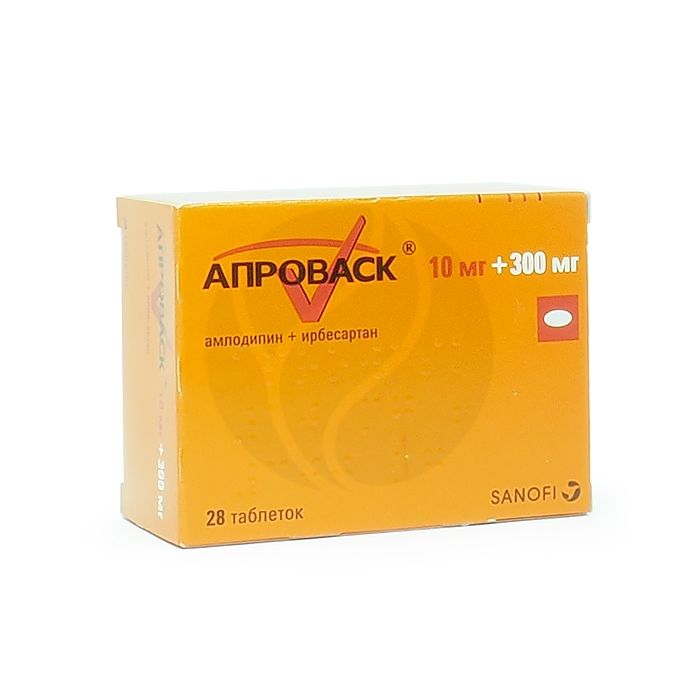Aprovask tablets 10 + 300mg, No. 28
Expiration Date: 05/2027
Russian Pharmacy name:
Апроваск таблетки 10+300мг, №28
Arterial hypertension (with the ineffectiveness of monotherapy with irbesartan or amlodipine).
The drug is taken orally with water, regardless of food intake. The initial and maintenance dose of AprovaskЃ is 1 tablet / day.
AprovaskЃ should be used in patients who fail to achieve target BP values ??with irbesartan monotherapy or amlodipine monotherapy, or to continue treatment in patients who are already taking irbesartan and amlodipine as separate tablets.
Doses should be selected individually, first with the use of separate preparations of irbesartan and amlodipine.
Doses are selected depending on the response of blood pressure to the therapy and the target blood pressure.
The maximum recommended dose of AprovaskЃ is 150 mg / 10 mg or 300 mg / 10 mg per day (due to the fact that the maximum daily dose of amlodipine is 10 mg). If it is necessary to change the dose of one of the active substances in the composition of the drug (for example, in connection with a newly diagnosed disease, a change in the patient's condition or drug interaction), an individual selection of doses of individual components is required.
The use of the drug in pediatric patients is contraindicated, the safety and efficacy of AprovaskЃ have not been established.
In elderly patients and patients with impaired renal function, dose adjustment is not required.
In patients with impaired liver function, AprovaskЃ should be used with caution, due to the presence of amlodipine in the drug.
In elderly patients with impaired liver function, it is necessary to reduce the initial dose of AprovaskЃ to 1 tab. 150 mg / 5 mg or 300 mg / 5 mg (contains the minimum dose of amlodipine).
amlodipine, irbesartan
hypersensitivity to irbesartan, amlodipine and other dihydropyridine derivatives, as well as excipients of the drug;
cardiogenic shock;
clinically significant aortic stenosis;
unstable angina (with the exception of Prinzmetal's angina);
simultaneous use with drugs containing aliskiren in patients with diabetes mellitus or with moderate to severe renal failure (glomerular filtration rate (GFR) <60 ml / min / 1.73 m2 of body surface) (see 'Interaction' and Special instructions');
simultaneous use with ACE inhibitors in patients with diabetic nephropathy (see 'Interaction' and 'Special instructions');
pregnancy;
breastfeeding period;
age up to 18 years (efficacy and safety have not been established).
With care: hypovolemia and hyponatremia, arising, for example, with intensive treatment with diuretics, hemodialysis, adherence to a diet with limited salt intake, diarrhea, vomiting (danger of excessive decrease in blood pressure, see 'Special instructions'); patients whose renal function depends on the activity of the RAAS (including with arterial hypertension with renal artery stenosis of one or both kidneys, chronic heart failure III-IV functional class according to the NYHA classification), treatment with drugs affecting the RAAS was associated with the development of oliguria and / or progressive azotemia and rarely - acute renal failure and / or death, the risk of which cannot be excluded when taking ARAII, including irbesartan) (see 'Special instructions');chronic heart failure II-IV functional class according to the NYHA classification of non-ischemic etiology (due to the content of amlodipine in the composition of the drug, the use of which in such patients was associated with an increase in reports of the development of pulmonary edema compared with placebo, despite the absence of differences in the rate of progression of cardiac insufficiency) (see 'Special instructions'); liver failure (risk of increased T1 / 2 of amlodipine - see 'Special instructions'); renal failure and after kidney transplantation (due to the content of irbesartan in the drug, it is recommended to control the potassium content and the concentration of creatinine in the blood); after a recent kidney transplant (lack of experience with the clinical use of irbesartan);aortic or mitral valve stenosis or hypertrophic obstructive cardiomyopathy; ischemic heart disease and / or clinically significant atherosclerosis of the cerebral vessels (with an excessive decrease in blood pressure, there is a risk of increased ischemic disorders, up to the development of acute myocardial infarction and stroke); sick sinus syndrome (due to the content of amlodipine in the drug).
'
